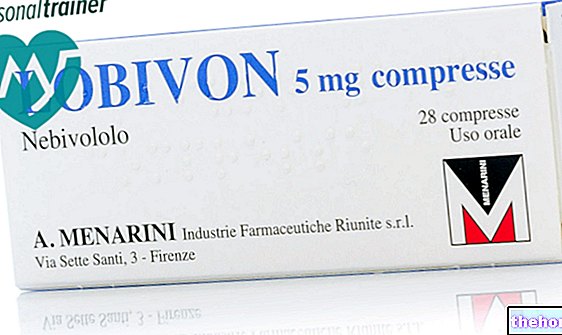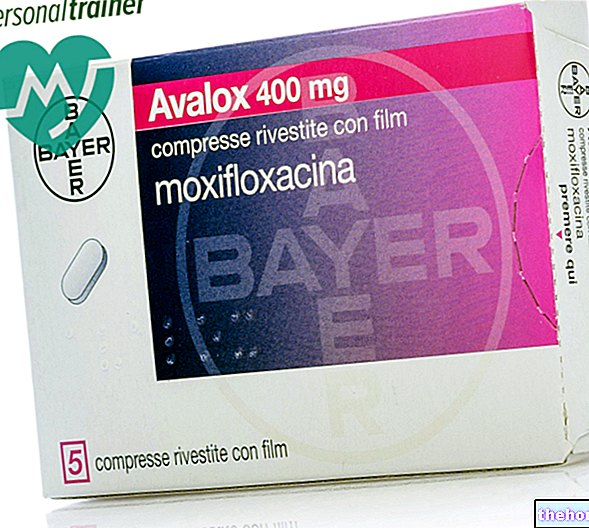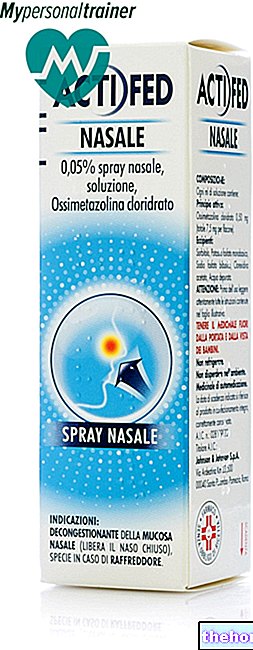Active ingredients: Tramazolin
Rinogutt 1 mg / ml nasal spray solution with eucalyptol
Indications Why is Rinogutt used? What is it for?
Rinogutt contains tramazoline.
Rinogutt is used in adults and adolescents from 12 years of age as a decongestant of the nasal mucosa, or to clear a blocked nose due to swelling of the nasal mucosa.
Talk to your doctor if you do not feel better or if you feel worse after 4 days
Contraindications When Rinogutt should not be used
Do not use Rinogutt
- if you are allergic to tramazoline or any of the other ingredients of this medicine, especially benzalkonium chloride (listed in section 6);
- if you suffer from dry nasal passages (rhinitis sicca);
- if you suffer from heart disease and severe increase in blood pressure;
- if you suffer from a form of glaucoma ie a disease characterized by an increase in the pressure of the fluid inside the eye (acute angle glaucoma);
- if you suffer from thyroid disease which can lead to weight loss, tiredness, weakness (hyperthyroidism);
- if you suffer from an enlarged prostate, the gland that produces seminal fluid in men (prostatic hypertrophy);
- if you have had nasal head surgery;
- if you are under the age of 12;
- if you are pregnant or breast-feeding (see section "Pregnancy and breast-feeding").
Precautions for use What you need to know before you take Rinogutt
Talk to your doctor or pharmacist before using Rinogutt:
- if you are taking monoamine oxidase (MAO) inhibitors or tricyclic antidepressants (medicines to treat depression);
- if you are taking vasopressor and antihypertensive medicines (medicines to treat heart disease and high blood pressure) (see section "Other medicines and Rinogutt").
Only use Rinogutt after consulting your doctor:
- if you are elderly;
- if you suffer from pheochromocytoma (a tumor of the adrenal glands which causes a rise in blood pressure);
- if you suffer from porphyria (a disease that interferes with the production of hemoglobin, a substance that allows red blood cells to carry oxygen into the blood, symptoms of which include excessive sensitivity to light, paralysis and severe stomach pain).
Be very careful if you suffer from heart and circulatory diseases, high blood pressure and enlarged prostate (prostatic hypertrophy) (see section "Do not use Rinogutt").
Also consult your doctor if these problems have occurred in the past.
Do not use Rinogutt by mouth.
Avoid contact of the liquid with the eyes to avoid irritation.
Children
Do not give this medicine to children under 12 years of age.
Interactions Which drugs or foods can modify the effect of Rinogutt
Tell your doctor or pharmacist if you are using, have recently used or might use any other medicines.
Rinogutt must not be administered when taking antidepressants (medicines to treat depression) and in the two weeks following treatment with these medicines: in fact, administration of Rinogutt together with antidepressant medicines, such as MAO inhibitors and tricyclic antidepressants, or together with vasopressor medicines, it can cause increased blood pressure and heart rhythm disturbances (arrhythmias).
Also tell your doctor if you are taking antihypertensive medicines as they can lead to various cardiovascular effects.
Warnings It is important to know that:
Pregnancy and breastfeeding
If you are pregnant or breast-feeding, think you may be pregnant or are planning to have a baby, ask your doctor or pharmacist for advice before using this medicine.
- Do not use Rinogutt during the first 3 months of pregnancy.
- Use Rinogutt from the 4th to the 9th month of pregnancy and during breastfeeding only on the advice of your doctor and after having evaluated the risk / benefit ratio with him.
Driving and using machines
You may experience side effects such as hallucinations, sleepiness, physical and mental relaxation (sedation), dizziness and tiredness during treatment with Rinogutt. Therefore, be careful when driving or using machines. If you experience the side effects mentioned above, avoid activities in which loss of attention could be dangerous, such as driving or using machines.
Rinogutt contains benzalkonium chloride
Rinogutt Nasal Spray Solution contains the preservative benzalkonium chloride which can cause irritation of the nasal mucosa and bronchospasm (narrowing of the bronchi which makes breathing difficult).
Attention for those who carry out sports activities: the product contains substances prohibited for doping. It is forbidden to take a different intake, for dosage schedule and route of administration, from those reported.
Dosage and method of use How to use Rinogutt: Dosage
Always use this medicine exactly as described in this leaflet or as directed by your doctor or pharmacist. If in doubt, consult your doctor or pharmacist.
The recommended dose is:
Adults and adolescents over 12 years: 1-2 sprays per nostril every 6-8 hours.
Warning: do not exceed the indicated doses. Do not use Rinogutt for more than 4 days.
Consult your doctor if the disorder occurs repeatedly or if you have noticed any recent changes in its characteristics.
Use the bottle by holding it vertically.
The bottle is equipped with a blower with a nasal adapter.
For correct use of the product, please observe the following:
- Activate the vacuum pump 5 times by pressing down with your fingers resting on the sides of the adapter.
- After blowing your nose, keeping your head in the normal position, insert the nozzle of the bottle into your nostril and spray.
- After the nebulization, inhale deeply with your mouth closed, in order to ensure a distribution of the solution on the entire nasal mucosa.
- The empty space above the liquid is necessary for a perfect functioning of the bottle as a nebulizer.
If you forget to use Rinogutt
Do not use a double dose to make up for a forgotten dose.
If you stop using Rinogutt
If you have any further questions on the use of this medicine, ask your doctor or pharmacist
Overdose What to do if you have taken too much Rinogutt
If you take too much Rinogutt contact your doctor or go to a hospital immediately.
Symptoms of overdosing can consist of:
- increase or decrease in blood pressure;
- increased heart rate (tachycardia);
- decrease in blood pressure with severe reduction in heart function (shock);
- reduction in heart rate, i.e. reduction in the number of heart beats per minute, to compensate for an increase in blood pressure (reflex bradycardia);
- uncontrolled body movements (convulsions);
- profound state of unconsciousness (coma);
- reduced respiratory activity (respiratory depression);
- anxiety, agitation, hallucinations;
- drop in body temperature (hypothermia);
- deep sleep with reduced response to normal stimuli (lethargy), drowsiness;
- dilation or narrowing of the pupil (mydriasis or miosis);
- sweating, fever, paleness;
- lips of blue color (cyanosis of the lips);
- partial or total reduction in heart activity (cardiovascular dysfunction, including cardiac arrest);
- partial or total reduction in respiratory activity (respiratory dysfunction, including respiratory failure and respiratory arrest);
- psychological changes.
Therapy
In case of accidental ingestion / intake of an overdose of Rinogutt, notify your doctor immediately or go to the nearest hospital.
In case of overdosing by the nasal route, wash or clean the nasal mucous membranes carefully immediately.
Especially in children, medical treatment may be needed
Side Effects What are the side effects of Rinogutt
Like all medicines, this medicine can cause side effects, although not everybody gets them.
If you use Rinogutt for long periods this can be harmful. The use, especially if prolonged, of the products to be administered locally can give rise to phenomena of irritation, inflammation and reduction of the thickness of the nasal mucosa; in this case, stop the treatment and consult your doctor to establish a suitable therapy.
Prolonged use can also induce addiction to the drug.
Swelling of the nasal mucosa (nasal edema) may occur when the drug ceases to work.
The following side effects may occur following the use of Rinogutt:
- allergy (hypersensitivity);
- perception of things that do not exist in reality (hallucinations);
- insomnia;
- restlessness;
- drowsiness;
- physical and mental relaxation (sedation);
- headache;
- dizziness;
- change in taste (dysgeusia);
- changes in the rhythm of the heart (arrhythmias);
- increased heart rate (tachycardia);
- feeling of increased heartbeat (palpitations);
- increased blood pressure;
- nosebleed (epistaxis);
- swelling of the nasal mucosa (nasal edema);
- burning inside the nose;
- nasal dryness;
- runny nose (runny nose);
- sneezing;
- nausea;
- skin rash (rash);
- itch;
- swelling of the skin (skin edema *);
- swelling of the mucous membranes (mucosal edema *);
- fatigue.
* as a symptom of hypersensitivity.
Reporting of side effects
If you get any side effects, talk to your doctor or pharmacist. This includes any possible side effects not listed in this leaflet. You can also report side effects directly via the national reporting system on the website of the Italian Medicines Agency: http://www.agenziafarmaco.gov.it/it/responsabili.By reporting side effects you can help provide more information on the safety of this medicine.
Expiry and Retention
This medicine does not require any special storage conditions.
After first opening the bottle, the medicine should be used within 1 year; after this period the excess product must be eliminated.
Keep this medicine out of the sight and reach of children.
Do not use this medicine after the expiry date which is stated on the carton after EXP. The expiry date refers to the last day of that month.
Do not throw any medicines via wastewater or household waste. Ask your pharmacist how to throw away medicines you no longer use. This will help protect the environment.
Deadline "> Other information
What Rinogutt contains
- the active ingredient is 1.265 mg tramazoline hydrochloride monohydrate equal to 1.01 mg tramazoline hydrochloride;
- the other ingredients are benzalkonium chloride (see section 2 "Rinogutt contains benzalkonium chloride"), citric acid, sodium hydroxide, hypromellose, polyvinylpyrrolidone, glycerol, magnesium sulfate, magnesium chloride, calcium chloride, sodium bicarbonate, sodium chloride, eucalyptol, menthol, camphor , purified water.
What Rinogutt looks like and contents of the pack
Rinogutt Nasal Spray Solution comes in the form of a nasal spray solution.
The contents of the package are 10 ml.
Source Package Leaflet: AIFA (Italian Medicines Agency). Content published in January 2016. The information present may not be up-to-date.
To have access to the most up-to-date version, it is advisable to access the AIFA (Italian Medicines Agency) website. Disclaimer and useful information.
01.0 NAME OF THE MEDICINAL PRODUCT -
RINOGUTT 1 MG / ML NASAL SPRAY, SOLUTION WITH EUCALYPTOL - 10 ML BOTTLE
02.0 QUALITATIVE AND QUANTITATIVE COMPOSITION -
1 ml of solution contains: tramazoline hydrochloride monohydrate 1.265 mg equal to tramazoline 1.01 mg (10 ml contain: tramazoline hydrochloride monohydrate 12.65 mg).
Excipient with known effect: benzalkonium chloride.
For the full list of excipients, see section 6.1.
03.0 PHARMACEUTICAL FORM -
Nasal spray, solution.
04.0 CLINICAL INFORMATION -
04.1 Therapeutic indications -
Decongestant of the nasal mucosa.
04.2 Posology and method of administration -
Adults and children over 12 years: after blowing the nose, spray 1-2 times per nostril every 6-8 hours.
Do not exceed the recommended dose.
If there is no complete therapeutic response within a few days, consult your doctor; in any case, the treatment must not be continued for more than 4 days.
The bottle must be used, holding it vertically.
The bottle is equipped with a nebulizer bulb with nasal adapter.
For correct use of the product, observe the following:
activate the vacuum pump 5 times by pressing down with your fingers resting on the sides of the adapter.
After blowing your nose, keeping your head in a normal position, insert the adapter into your nostril and spray.
After nebulization, inhale deeply with your mouth closed in order to ensure that the solution is distributed over the entire nasal mucosa.
The empty space above the liquid is necessary for a perfect functioning of the bottle as a nebulizer.
04.3 Contraindications -
Hypersensitivity to the active substance or to any of the excipients; in particular towards tramazoline hydrochloride, benzalkonium chloride. Sicca rhinitis, heart disease and severe arterial hypertension. Acute angle glaucoma, hyperthyroidism, prostatic hypertrophy. Pregnancy and breastfeeding. Rinogutt Nasal Spray Solution with eucalyptol should not be used after cranial surgery performed via the nose.
The drug is contraindicated in children under 12 years of age.
04.4 Special warnings and appropriate precautions for use -
Due to the possibility of systemic absorption Rinogutt Nasal Spray Solution with eucalyptol should be used with caution and under medical supervision in patients with arterial hypertension, prostatic hypertrophy, pheochromocytoma and porphyria Caution should be exercised in patients treated with MAO inhibitors, antidepressants tricyclics, vasopressor and antihypertensive drugs (see section 4.5).
In elderly subjects use only after consulting a doctor due to the danger of urinary retention. The product is reserved for adults and children over 12 years.
Strictly follow the recommended doses. The product, if accidentally ingested or if used for a long period in excessive doses, can cause toxic phenomena. In patients with cardiovascular diseases and especially in hypertensive patients, the use of nasal decongestants must in any case be subjected to the judgment of the doctor from time to time. The product should be kept out of reach of children since accidental ingestion can cause severe depression of the central nervous system. with marked sedation (see section 4.9). It must not be used orally. Avoid contact of the liquid with the eyes so as not to cause irritation.
Prolonged use of vasoconstrictors for topical nasal use can alter the normal function of the mucous membrane of the nose and paranasal sinuses, causing chronic inflammation and atrophy, and can also induce addiction to the drug. Repeating applications for long periods can be harmful. L "use, especially if prolonged, of topical products can give rise to sensitization phenomena; in this case it is necessary to interrupt the treatment and consult the doctor to establish a suitable therapy.
When the vasoconstricting effect of the drug ceases, swelling of the nasal mucosa (nasal edema) may occur due to reactive hyperemia.
Rinogutt Nasal Spray Solution with eucalyptol contains the preservative benzalkonium chloride which can cause irritation of the nasal mucosa and bronchospasm.
04.5 Interactions with other medicinal products and other forms of interaction -
Rinogutt Nasal Spray Solution with eucalyptol must not be administered during therapy with antidepressant drugs and in the two weeks following the administration of the latter. Administration of Rinogutt Nasal Spray Solution with eucalyptol concomitantly with antidepressant drugs (MAO inhibitors or tricyclic antidepressants) or with vasopressor drugs, can cause an increase in blood pressure. Its use in combination with tricyclic antidepressants can also cause arrhythmias.
Interactions with antihypertensive drugs, especially those whose action involves the sympathetic nervous system, can be complex and lead to various cardiovascular effects.
04.6 Pregnancy and breastfeeding -
Rinogutt Nasal Spray Solution with eucalyptol should not be used during the first trimester of pregnancy. In the second and third trimester of pregnancy and during lactation the product can only be used on the advice of the doctor. Safety during lactation has not been established.
04.7 Effects on ability to drive and use machines -
No studies have been performed to investigate the effects of Rinogutt Nasal Spray Solution with eucalyptol on the ability to drive or use machines.
However, patients are advised that undesirable effects such as hallucinations, drowsiness, sedation, dizziness and fatigue may occur during treatment with Rinogutt Nasal Spray Solution with Eucalyptol. Therefore, it is recommended that caution be exercised when driving vehicles or using machines. If patients experience the above side effects they should avoid activities in which loss of attention could be potentially dangerous, such as driving or operating machinery.
04.8 Undesirable effects -
The following side effects may occur following the use of Rinogutt Nasal Spray Solution with eucalyptol:
Immune system disorders:
Hypersensitivity
Psychiatric disorders:
Hallucinations, insomnia, restlessness
Nervous system disorders:
Somnolence, sedation, headache, dizziness, dysgeusia
Cardiac disorders:
Arrhythmias, tachycardia, palpitations
Respiratory, thoracic and mediastinal disorders:
Epistaxis, nasal edema, burning in the nose, nasal dryness, rhinorrhea, sneezing
Gastrointestinal disorders:
Nausea
Skin and subcutaneous tissue disorders:
Rash, pruritus, skin edema *
General disorders and administration site conditions:
Mucosal edema *, fatigue
Diagnostic tests:
Increased blood pressure
* as a symptom of hypersensitivity
04.9 Overdose -
Symptoms
An increase in blood pressure and tachycardia can, especially in children, be followed by a fall in blood pressure, subnormal temperatures, shock and reflex bradycardia.
Similarly to other alpha-sympathomimetic drugs, the clinical picture of an intoxication with Rinogutt Nasal Spray Solution with eucalyptol can be confused, since phases of stimulation and depression of the central nervous system and the cardiovascular system can be alternated.
Especially in children, intoxications produce effects on the Central Nervous System such as convulsions and coma, bradycardia, respiratory depression. Central nervous system stimulation symptoms are anxiety, agitation, hallucinations and convulsions. Central nervous system depression symptoms are hypothermia, lethargy, drowsiness and coma.
In addition, the following symptoms may occur: mydriasis, miosis, sweating, fever, pallor, cyanosis of the lips, cardiovascular dysfunction, including cardiac arrest, respiratory dysfunction, including respiratory failure and respiratory arrest, psychological alterations.
Therapy
In case of nasal overdose, wash or clean the nasal mucous membranes carefully immediately. Symptomatic treatment may be required.
05.0 PHARMACOLOGICAL PROPERTIES -
05.1 "Pharmacodynamic properties -
Pharmacotherapeutic group: sympathomimetics, unassociated.
ATC code: R01AA09.
Rinogutt Nasal Spray Solution with eucalyptol contains a synthetic substance, tramazoline hydrochloride, which has vasoconstrictive properties on small vessels, with good local and general tolerability. The Rinogutt Nasal Spray Solution with eucalyptol therefore finds its use of choice in all those affections of the nasal mucosa that are accompanied by hyperemic and edematous states, such as colds.
After intranasal administration of Rinogutt Nasal Spray Solution with eucalyptol the vasoconstrictor effect and therefore the mucosal decongestion effect usually occurs in five minutes and lasts for 8 - 10 hours.
05.2 "Pharmacokinetic properties -
Pharmacokinetic studies have not been conducted in humans.
The pharmacokinetic behavior of tramazoline was studied in rats, rabbits and primates. It has been shown that 50-80% of the dose is absorbed after oral or intranasal administration.
Tramazolin and its metabolites are distributed in all internal organs reaching the highest concentration in the liver. After oral and local administration of the drug, three major metabolites of tramazoline were found in the urine. Tramazoline and its metabolites are eliminated mainly by the kidneys with a final half-life ranging from 5 to 7 hours.
05.3 Preclinical safety data -
Single dose toxicity studies of tramazoline hydrochloride were performed in mice and rats. In mice, the LD50 values were 57, 77 and 195 mg / kg per body weight after intraperitoneal, subcutaneous and oral administration, respectively. In rats of different age groups, the LD50 values after intraperitoneal administration were respectively 37.5 (age: 12-24 hours),> 67 (age: 30-33 days) or 37 mg / kg for body weight (age : 90-100 days). Repeated dose toxicity studies by the oral route were performed in rats and monkeys. A 12-month study in rats, administering doses up to 3 mg / kg body weight per day of the drug (mixed with food) did not reveal any undesirable effects related to tramazoline hydrochloride. In a 6-month study in rats at doses of 5 mg / kg per body weight per day (force feeding), no undesirable effects were observed except for a slight proliferation of cardiac interstitial connective tissue. Doses up to 6 mg / kg bodyweight per day administered for 2 years in monkeys did not cause undesirable effects.
A 90-day study in monkeys administered intranasally with doses higher than the maximum recommended daily doses in humans, with 8 single doses per day, showed no undesirable effects. tramazoline hydrochloride (60 mg / ml), 6 times daily in rabbit eye did not cause adverse reactions except mydriasis. In a bacterial reverse mutation test, tramazoline hydrochloride did not cause genetic mutations. No other genotoxicity studies have been performed. A 2-year study in rats with doses up to 3 mg / kg bw per day (mixed with food) did not indicate a tumorigenic effect of the drug.
Studies to evaluate the toxic effects of tramazoline on the reproductive capacity of rats and rabbits, to which doses up to 3 mg / kg body weight per day were administered orally, did not reveal any embryotoxic or teratogenic effects attributable to the drug.
Reduced milk production was observed in rats at doses ≥ 3 mg / kg bw per day, however no drug-attributable effect was seen on both male and female fertility, and pre- and postnatal development.
06.0 PHARMACEUTICAL INFORMATION -
06.1 Excipients -
Citric acid, sodium hydroxide, benzalkonium chloride, hypromellose, polyvinylpyrrolidone, glycerol, magnesium sulfate, magnesium chloride, calcium chloride, sodium bicarbonate, sodium chloride, eucalyptol, menthol, camphor, purified water.
06.2 Incompatibility "-
In the absence of incompatibility studies, this medicinal product must not be mixed with other products.
06.3 Period of validity "-
3 years.
Shelf life after first opening the bottle: 1 year.
06.4 Special precautions for storage -
No storage conditions.
06.5 Nature of the immediate packaging and contents of the package -
10 ml amber glass bottle and dosing pump.
06.6 Instructions for use and handling -
No special instructions.
07.0 HOLDER OF THE "MARKETING AUTHORIZATION" -
Boehringer Ingelheim Italia S.p.A.
Via Lorenzini, 8
20139 Milan.
08.0 MARKETING AUTHORIZATION NUMBER -
A.I.C. no .: 023547060 "1 mg / ml nasal spray, solution with eucalyptol" 10 ml glass bottle with dosing pump
09.0 DATE OF FIRST AUTHORIZATION OR RENEWAL OF THE AUTHORIZATION -
31.10.1994
10.0 DATE OF REVISION OF THE TEXT -
01.06.2010
11.0 FOR RADIO DRUGS, COMPLETE DATA ON THE INTERNAL RADIATION DOSIMETRY -
December 20, 2016























-nelle-carni-di-maiale.jpg)




